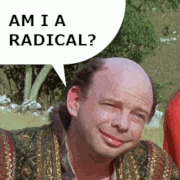|
Dead Reckoning posted:This doesn't tell us anything that we didn't already know. Their reaction to the possibility of triggering inflation through money printing is that they would use the "time-honored ways of preempting it," which they list as taxes, bond issuance, etc. The only novelty MMT seems to have is that it offers a rhetorical device for decoupling the massive spending they're asking for from the eventual need to deal with its consequences. I think the difference is that depending on how you frame the question, you will come up with different policy solutions. If you're looking at a GND and are asking how do we ensure that it doesn't raise the deficit too much, you will very possibly come up with a different policy than if you're asking, how do we ensure that inflation doesn't spike to much? For example, say you want to fully "pay for" a GND, and you decide a GND will cost 3 trillion over ten years. Then you need to create three trillion in additional revenue to pay for it. But, if the question is how do we make sure inflation doesn't spike too much, then you're estimating how much you think inflation would rise, and deciding how much money to take out of the economy to stem that inflation. That number could be much less than 3 trillion, depending on how much you think inflation will rise. And that's also the point of that analysis, which is it''s possible a GND wouldn't raise inflation at all, in which case taking money out of the economy isn't necessary. MMT doesn't mean that we can just spend money freely. We always have to account for inflation. But the limit of what we can spend is different than if we're looking at through the lens of worrying about deficits and debt.
|
|
|
|

|
| # ? Apr 29, 2024 16:34 |
Hentai Jihadist posted:I've never really understood why people have such trouble understanding MMT. Certain individuals are working really, really hard to not understand.
|
|
|
|
|
Dead Reckoning posted:I think everyone understands the theory, the question is whether that theory tells us anything useful about how we should run our government. Because same people are saying, "well, it's really just a more accurate way to model what already happens", and others are saying, "Actually, it lets us spend whatever we want on democratic policy priorities without raising taxes." It tells us that hyperinflation is a stupid loving bogeyman. And it tells us that a "balanced" budget is meaningless. So we should measure the inflationary/deflationary effects (and money multiplier effects) of spending programs, and the same effects of tax structures separately. Because they're un-loving-related. It's like deficit hawks think that's a bad faith argument? Maybe because they use bad faith arguments to justify their spending preferences? If this looks like a left-wing biased theory... maybe it's because there's a factual basis for these policies instead of just a tribal preference.
|
|
|
|
theblackw0lf posted:I think the difference is that depending on how you frame the question, you will come up with different policy solutions. If you're looking at a GND and are asking how do we ensure that it doesn't raise the deficit too much, you will very possibly come up with a different policy than if you're asking, how do we ensure that inflation doesn't spike to much? E: It also still hasn't solved the normative problem of selling constituents on, "We need to take money out of your bank account, not to do anything useful with it, but to destroy it so that the economy doesn't overheat." Dead Reckoning fucked around with this message at 19:30 on Feb 15, 2019 |
|
|
|
from a pure political mechanism perspective MMT also demonstrates how dysfunctional the US system is that we are basically talking about relegating the responsibility of revenue raising from an elected legislature to an unelected technocratic institution
|
|
|
|
Dead Reckoning posted:E: It also still hasn't solved the normative problem of selling constituents on, "We need to take money out of your bank account, not to do anything useful with it, but to destroy it so that the economy doesn't overheat." Still chewing on the other comment, but this I agree with. This is one reason why Bernie didn't embrace MMT
|
|
|
|
Inflation isn't a bad thing. Too much inflation is a bad thing. But too little inflation is also a bad thing. Those are factual and politically neutral statements. Inflation is a good thing, because it eases debts and increases liquidity in the economy. It also devalues savings and capital, while not devaluing labor (hypothetically), transferring power from the haves to the have-nots. Those are politically loaded statements, but are still good faith arguments, even if you don't want that outcome. Typo posted:from a pure political mechanism perspective MMT also demonstrates how dysfunctional the US system is that we are basically talking about relegating the responsibility of revenue raising from an elected legislature to an unelected technocratic institution
|
|
|
|
Infinite Karma posted:Inflation isn't a bad thing. Too much inflation is a bad thing. But too little inflation is also a bad thing. Those are factual and politically neutral statements. And that's why examining policy through the lens of does it increase/decrease inflation, as opposed to the effect it will have on the defiicit is so essential. Because it's very possible that we're actually in a deflationary cycle and if we try to "pay for" some of our social programs like M4A through tax increases that would also target the middle class (which for example Bernie's does) we possibly risk actually causing more deflation.
|
|
|
|
Infinite Karma posted:Inflation is a good thing, because it eases debts and increases liquidity in the economy. It also devalues savings and capital, while not devaluing labor (hypothetically), transferring power from the haves to the have-nots. Those are politically loaded statements, but are still good faith arguments, even if you don't want that outcome. How does it devalue capital but not labor? One of the major intended consequences of inflation is to give employers "flexibility" in adjusting worker salaries. Basically everyone gets auto-wage cut of 2-4% a year without rioting in the streets, since people get pissed at direct cuts to their salary of 2% a year but "oh you got a 1% raise instead of 2%" is likely to be brushed off more easily. and how does it devalue capital exactly? Asset prices, short of very liquid asset like cash, rise with inflation. Inflation screws over people with savings in liquid assets but is neutral or reward people with "harder" assets like housing or stock shares. Poor people have very little of the latter. The reason why some low rates inflation is good is because macroeconomics, namely that inflation encourages consumption and investment and -deflation- leads to very nasty consequences as the 1930s demonstrated. Typo fucked around with this message at 22:18 on Feb 15, 2019 |
|
|
|
Dead Reckoning posted:E: It also still hasn't solved the normative problem of selling constituents on, "We need to take money out of your bank account, not to do anything useful with it, but to destroy it so that the economy doesn't overheat."
|
|
|
|
Dead Reckoning posted:I think everyone understands the theory, the question is whether that theory tells us anything useful about how we should run our government. Because same people are saying, "well, it's really just a more accurate way to model what already happens" Agreed. It isn’t a very useful “policy design model”, to use lingo from engineering, because one of the key inputs to the model, inflationary risk, is hard to predict. I’m not sure how you meaningfully apply the model to make government decisions in real time, except if you don’t think about it too much, and just want to say: Dead Reckoning posted:"Actually, it lets us spend whatever we want on democratic policy priorities without raising taxes."
|
|
|
|
silence_kit posted:Agreed. It isn’t a very useful “policy design model”, to use lingo from engineering, because one of the key inputs to the model, inflationary risk, is hard to predict.
|
|
|
|
silence_kit posted:Agreed. It isn’t a very useful “policy design model”, to use lingo from engineering, because one of the key inputs to the model, inflationary risk, is hard to predict. If that were true then this objection would equally apply to any current government spending since we apparently we just cannot know whether that latest tax cut or expenditure will trigger a round of impossible to predict inflation.
|
|
|
|
Been waiting for this. Ezra Klein has Stephanie Kelton and also Jason Furman to debate MMT, and I found it very revealing and helped clear up a lot of the confusion I had. https://www.vox.com/ezra-klein-show-podcast
|
|
|
|
Someone from Jacobin did a hit piece on MMT and a job guarantee (semi) recently, I'll admit to not being equipped to really know how much their critiques are valid: https://www.jacobinmag.com/2019/02/modern-monetary-theory-isnt-helping
|
|
|
|
This is a good summary on MMT https://twitter.com/sdgrumbine/status/1102691245284093953?s=21
|
|
|
TrixR4kids posted:Someone from Jacobin did a hit piece on MMT and a job guarantee (semi) recently, I'll admit to not being equipped to really know how much their critiques are valid: https://www.jacobinmag.com/2019/02/modern-monetary-theory-isnt-helping My take is this is actually the author's concern: quote:Taxation may not be full expropriation but it’s the next best thing in this fallen world. It is a form, however mild, of socialization — transforming private investment and consumption into public expenditures. And divorcing taxation of the rich from the provision of public services throws aside the material and agitational advantages of waging class war through fiscal politics. Rich people would have a lot harder time complaining about their money being taken to educate kids and save the planet than if it were taken just because they’re too rich.
|
|
|
|
|
Yeah but again isn't it better to model reality rather than just pretend we're still on the gold standard and the government has a big scrooge mcduck pool of money? "The poor are too stupid for the truth" is not a very good left wing argument.
|
|
|
|
Also the rich already complain about their money being taken to educate kids and save the planet, and the political response has been to take less of their money at the expense of not educating kids and ruining the planet. So on an empirical basis the argument falls flat. Frankly I don't think "we're taking their money because they have too loving much of it" is all that bad a take. I'm convinced. It's shorter and simpler and more to the point than having to justify whatever you're going to pay for with the taxes.
|
|
|
|
MSDOS KAPITAL posted:Frankly I don't think "we're taking their money because they have too loving much of it" is all that bad a take. I'm convinced. It's shorter and simpler and more to the point than having to justify whatever you're going to pay for with the taxes.
|
|
|
|
MSDOS KAPITAL posted:Also the rich already complain about their money being taken to educate kids and save the planet, and the political response has been to take less of their money at the expense of not educating kids and ruining the planet. So on an empirical basis the argument falls flat. Money directly translates into political power
|
|
|
|
MMT: Sense Or Nonsense?quote:Before I get into details, I want to make it clear where I stand. I don’t agree with everything in MMT. However, those aspects with which I disagree have never been part of the public debate and they make no difference whatsoever to the policy recommendations. To the general public, they would be minutia (although they might be worth a couple of journal articles!). I mention this simply to assure the reader that I’m actually critical of some aspects of MMT and am not simply toeing the party line here.
|
|
|
|
TrixR4kids posted:Someone from Jacobin did a hit piece on MMT and a job guarantee (semi) recently, I'll admit to not being equipped to really know how much their critiques are valid: https://www.jacobinmag.com/2019/02/modern-monetary-theory-isnt-helping Gist is pretty much what's been brought up here: -How can legislation respond to economic needs (enforcing taxes in response to inflation) when they're already slow as molasses? -What if rich people don't want to be taxed? -What if hyperinflation? To which my response is: -Already a problem unaddressed by current tax model, loving take care of people. -Already a problem unaddressed by current tax model, loving take care of people. -For most countries this is a legitimate concern. However, the US has the strongest economy in the world and every other country is invested in making sure USD retains value. If the USD fails it's not gonna be from welfare progtams, it'll be because there's a global Communist revolt which MMT might help prevent.
|
|
|
|
MixMastaTJ posted:-What if hyperinflation?
|
|
|
|
Infinite Karma posted:I have to wonder if this is a legitimate concern. Have strong economies ever actually "oopsed" their way into hyperinflation? In real life, the only examples I can think of were places that were weak economies already in dire straits - hyperinflation is one kind of market crash, but they were on a path towards a devastating market crash regardless. Are there prosperous countries who imploded that I don't know about? My theory is the stagflation of the 70s scared so many economists they basically have a mild form of PTSD about this potential hypothetical hyperinflation that has never been a true threat to America.
|
|
|
|
TrixR4kids posted:Someone from Jacobin did a hit piece on MMT and a job guarantee (semi) recently, I'll admit to not being equipped to really know how much their critiques are valid: https://www.jacobinmag.com/2019/02/modern-monetary-theory-isnt-helping Somehow I knew something like this was coming before it shows up late in the article: quote:On social media, the style of argumentation is even more striking. Critiques are first met with the assertion that you just don’t understand — you haven’t read enough of the literature to comment knowledgeably. But they’re quick to resort to mockery and insult. One of my favorite instances came from two of the more prominent younger members of the school, who had these persuasive reactions to my critiques on Facebook. Henwood has been around left spaces for a long time and probably isn't terribly well accustomed to being attacked by a younger generation of lefties who are saying he's actually too conservative in his thinking. In its own way this kind of comes off as the lefty economist equivalent of that Jonathan Chait piece complaining about the totalitarian campus radicals who don't give him enough respect. It's kind hard to separate his judgement that MMT is a terrible misstep in the left's Gramscian war of position from his personal feeling of aggrievement over the unfair treatment that he and some others have endured online from advocates of MMT. That isn't to say that there's nothing of substance in that article but the author really rhetorically overplays his hand. This piece just calls out for a re-write that maybe involves fewer allusions to Henwood's hurt feelings.
|
|
|
|
tl;dr when you're a published academic author writing a longform critique of a rival school of economics you probably shouldn't include random screenshots of somebody on facebook making fun of you by capitalizing their words in a funny way. Yes every published author actually is that thin skinned in real life but usually by the time you're as old as Henwood is you've gotten better as disguising it!
|
|
|
|
Really encourage people to read this article on how MMT views inflation, and why that's so important for making policy decisions https://ftalphaville.ft.com/2019/03/01/1551434402000/An-MMT-response-on-what-causes-inflation/ One thing I realized while reading this piece is why, if the MMT view is correct, it's so important to view policy from this framework. Because if the only real constraint to government spending is inflation, then it's important that we shape policies based on how we think that will affect inflation. And that will lead to different policy prescriptions then if you're concerned about deficits. If you're concerned about deficits, the answer is increasing revenue through taxes. But if you're concerned about inflation, there's way more tools in the tool box besides just taxes. And inflation is primarily a resource scarcity issue. So the answer might not be raising taxes, it might be finding ways to increase resources. Or it might be increased regulations to restrict companies that eat up resources. In fact, there's a possibility that taxes, depending what they are, actually might further limit resources and end up increasing inflation.
|
|
|
|
Could you give an example of how taxes might increase inflation? I’m having trouble imagining it
|
|
|
|
theblackw0lf posted:[...] inflation is primarily a resource scarcity issue. So the answer might not be raising taxes, it might be finding ways to increase resources. Or it might be increased regulations to restrict companies that eat up resources.
|
|
|
|
theblackw0lf posted:Really encourage people to read this article on how MMT views inflation, and why that's so important for making policy decisions This is absolutely not the only restraint on government spending. Under capitalism the health of the economy relies on the accumulation of capital within the private economy. If you pass a bunch of policies that reduce the social power of the boss (i.e. getting fired is no longer scary because you always have a government job waiting for you) then this can undermine the profitability of capitalist firms. It cannot be emphasized enough that while MMT gives us an interesting way to think about fiscal policy it does not solve the problem of class conflict. No amount of good fiscal policy can compensate for the fundamental imbalances of power that actually structure the economy. As long as government is run by and for the rich MMT alone cannot achieve anything. MMT will be useful insofar as it aids the left in its war of position with the capitalist class. Squalid posted:Could you give an example of how taxes might increase inflation? I’m having trouble imagining it A tax on fuel could increase costs throughout the economy which might be passed on to consumers in the form of a price increase.
|
|
|
|
Helsing posted:A tax on fuel could increase costs throughout the economy which might be passed on to consumers in the form of a price increase. Yeah that makes sense, a consumption tax has an effect similar to inflation by increasing consumer prices. However I'm skeptical that that would have implications beyond the specific product that was taxed, as it would also necessarily decrease the money supply.
|
|
|
|
Infinite Karma posted:Having the government "fiat" its way into building out infrastructure (instead of "borrowing" it, i.e. enriching finance companies in a shell game) is a huge win for available resources that will offset inflation. What the gently caress does this even mean
|
|
|
|
Typo posted:What the gently caress does this even mean Government prints money to pay for building solar power plants and fiber internet and smart grids and other useful things, instead of borrowing it or getting it from taxes. These are scarce resources that can be used by the public. Instead of there being more money in circulation to buy the same amount of resources (this is inflation), there is more money in circulation to buy more resources (which is not inflation).
|
|
|
|
I think this might help shed on light on a hypothetical MMT approach to inflation. It also points out some of the failures of the current approach and suggests why an MMT approach might be better.Financial Times posted:
Helsing fucked around with this message at 23:15 on Mar 6, 2019 |
|
|
|
Squalid posted:Could you give an example of how taxes might increase inflation? I’m having trouble imagining it Technically any tax will reduce consumption, universally lowering demand and thus reducing economic growth. Consumption, however, grows logarithmicly with income, meaning reducing disposable income for the poor lowers their consumption more than reducing it for the wealthy. If reduction in consumption exceeds wealth taken you have inflation.
|
|
|
|
MixMastaTJ posted:
isn't that actually deflationary? Since you are reducing consumption more than the money in circulation?
|
|
|
|
taxes can cause inflation if you assume there's no propensity to consume at the individual/household level and you take the money and the government spends it
|
|
|
|
45 ACP CURES NAZIS posted:Money directly translates into political power
|
|
|
|

|
| # ? Apr 29, 2024 16:34 |
|
Typo posted:isn't that actually deflationary? Since you are reducing consumption more than the money in circulation? Inflation is the ratio of money in circulation to the actual value of the economy. Say there's a hundred dollars in the economy and a hundred dollars worth of widgets. If we pump 100 dollars in without changing the number of widgets, a widget worth 1 dollar now sales for 2. likewise, if we reduce the number of widgets available by half while still only having 100 dollars, each dollar widget is now two dollars. If you reduce consumption, demand for widgets will drop along with the profit of widgets. While on a local level the cost for a widget might drop, overall the goods and services available in the economy will drop, meaning each dollar now has less spending power. Infinite Karma posted:I have to wonder if this is a legitimate concern. Have strong economies ever actually "oopsed" their way into hyperinflation? In real life, the only examples I can think of were places that were weak economies already in dire straits - hyperinflation is one kind of market crash, but they were on a path towards a devastating market crash regardless. Are there prosperous countries who imploded that I don't know about? I mean, big one was Germany. Granted a LOT more was going on with Germany. I'd be concerned about a middle income country like Mexico going nuts with MMT. But yeah, pretty sure Pounds, Loonies or Euros would be hard to kill. MixMastaTJ fucked around with this message at 03:26 on Mar 7, 2019 |
|
|



























